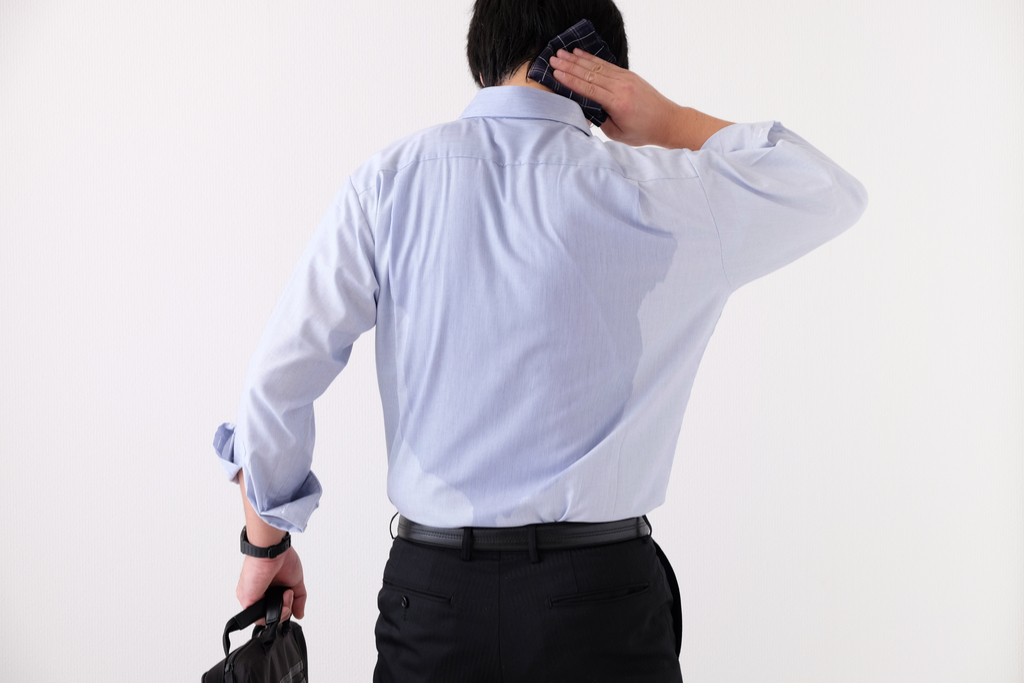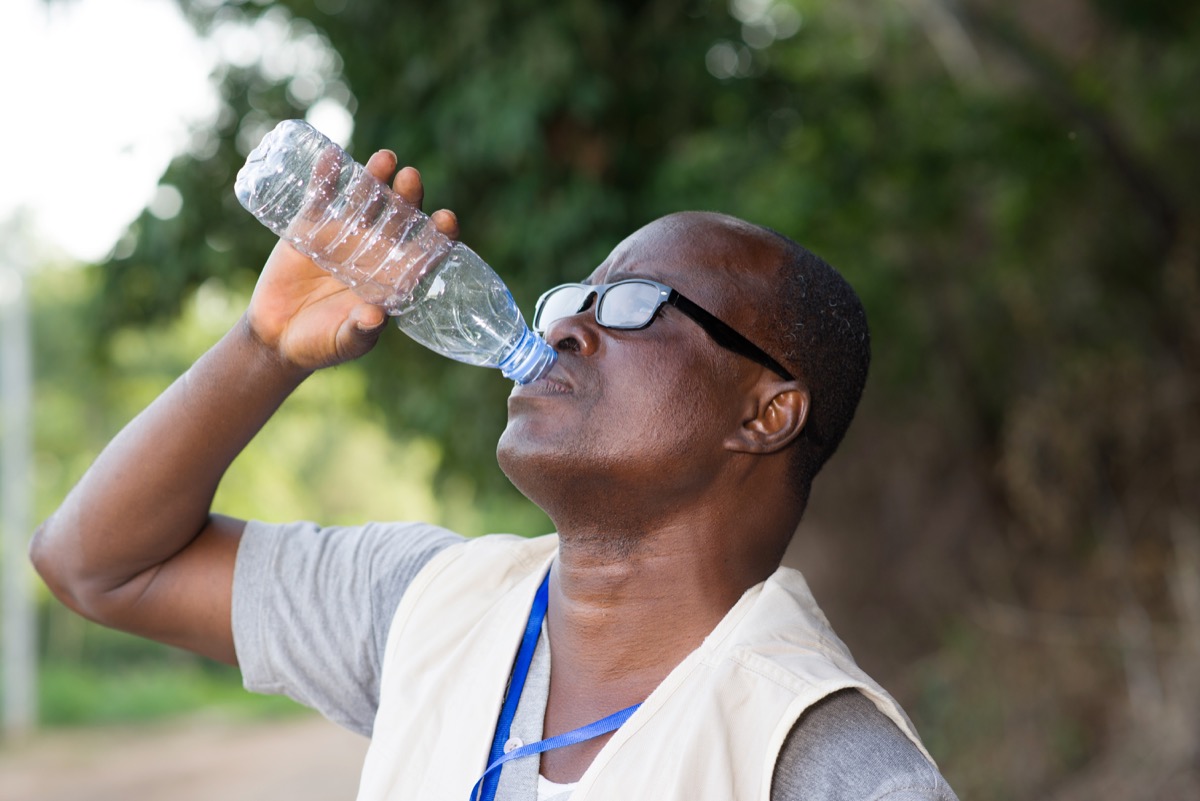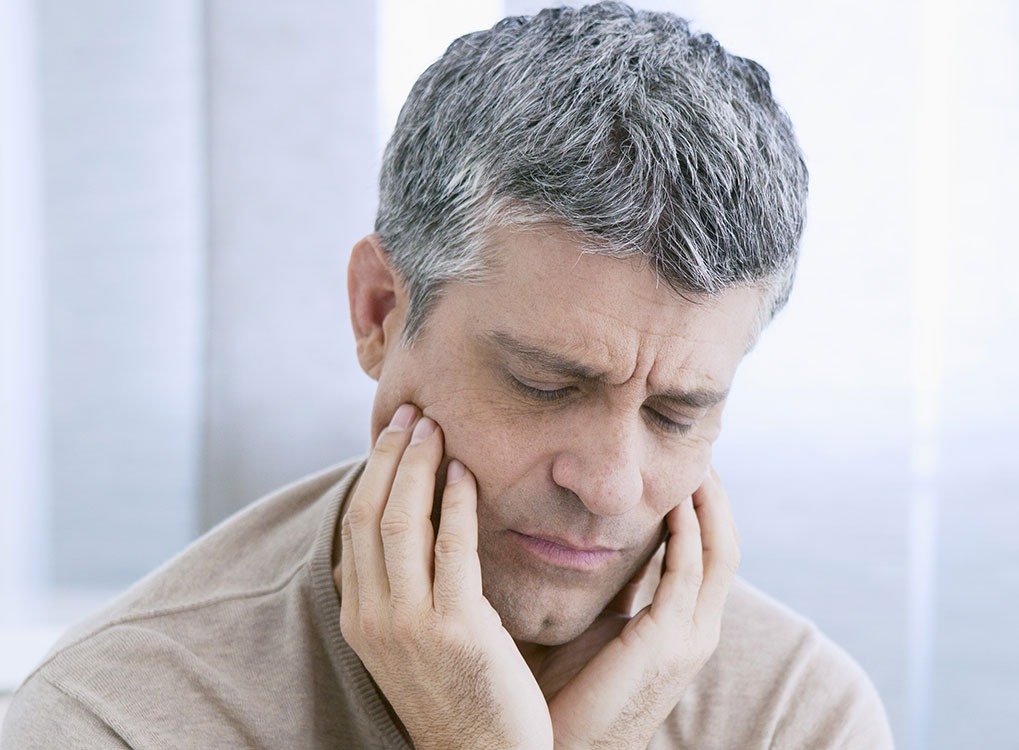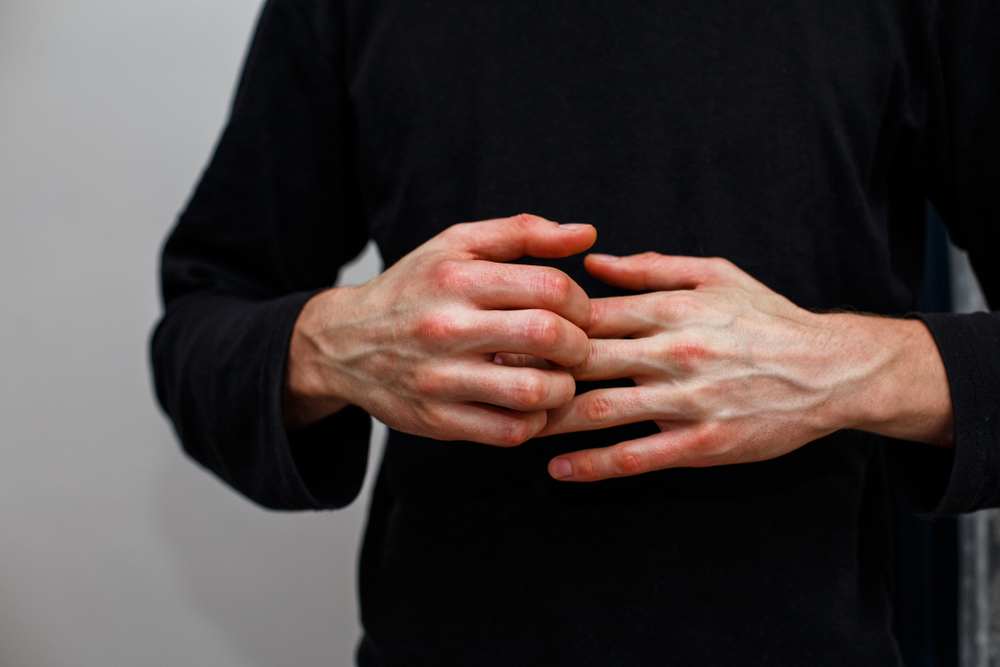Bad breath isn’t always a sign of an onion-filled lunch. Rather, it’s “often associated with gingivitis” or gum disease, says Joshua S. Yamamoto, MD, a cardiologist and co-author of You Can Prevent a Stroke. It might not seem like a big deal, but Yamamoto notes that “there is a correlation between poor gingival health and vascular inflammation,” which can lead to heart disease. And for some things you need to stop believing when it comes male health problems, check out 20 Worst Men’s Health Myths That Just Won’t Die.
Weight loss is only something to be celebrated when it is intentional. Otherwise, Yamamoto warns that “it can be associated with uncontrolled diabetes, heart failure, and cancer.” And for some tips on shedding a few extra pounds the healthy way, check out 101 Ultimate Weight Loss Tips for Summer 2020.
Many people find that their ankles are uncomfortably swollen after a long flight—and that’s perfectly normal. What’s not normal, however, is having swollen feet and ankles all day every day. “A heart that is not working well can fail to adequately circulate blood, and swollen feet and ankles can be an early sign of a failing heart,” warns Yamamoto.
With cars flashing their brights at you and poorly lit roads, driving at night isn’t easy for anyone. However, if you find that driving after sunset is becoming increasingly difficult, this could be a sign of an eye issue. “If a patient, generally age 50 and above, is bothered by symptoms such as difficulty in dim light, glare and halos, and trouble driving at night, they should consider seeing an eye doctor as this could indicate that they may need to have cataract surgery,” says Ming Wang, MD, PhD, of the Wang Vision Institute in Nashville, Tennessee. “Once performed, surgery can generally alleviate these symptoms.” And for other subtle signs of serious illness, check out 30 Things You Had No Idea Could Cause Cancer.
“One of the most commonly misunderstood symptoms of a sinus infection is eye pain,” says Wang. “This occurs because the sinuses sit in areas above, below, and next to the eyes. When pressure builds up in these areas, it can cause a dull pain that feels like it is coming from around or behind the eyes when it is actually coming from the sinuses.” And for more on what your vision issues may be indicating about your well-being, check out 17 Warning Signs Your Eyes Are Trying to Tell You About Your Health.
People of all ages and genders suffer from poor vision that requires correction. But while it’s unfortunately normal for our eyes to slowly deteriorate, you should be slightly more concerned if your vision changes suddenly out of the blue. “Sudden vision changes could indicate a wide range of issues including macular degeneration, diabetic eye disease, vascular occlusions in the eye, retinal detachment, acute glaucoma, and more,” says Wang. “Patients should seek the care of an eye doctor immediately with any sudden vision change.” People with allergies—especially seasonal ones—are all too familiar with the feeling of dry eyes. However, if you have no known allergies and find yourself experiencing dry eyes nonetheless, this may be because of hepatitis C. In one 2007 study published in the American Journal of Ophthalmology, scientists found that 50 percent of hepatitis C patients had decreased tear production. “Dry eye syndrome is the most frequently observed ocular feature in [hepatitis C] infection,” the study authors concluded.
Even a slight yellowing of the otherwise white areas of your eyes is something to look out for. It could be a sign that there’s “an underlying issue involving the liver, pancreas, or gall bladder,” explains Thanu Jey, CSCS, FCE, DC, clinical director of the Yorkville Sports Medicine Clinic in Canada. And for more helpful information delivered to your inbox, sign up for our daily newsletter.
“Fatigue can be related to a number of different issues, and talking with your physician can narrow down a potential diagnosis,” explains Erik Polan, DO, assistant professor of internal medicine at Philadelphia College of Osteopathic Medicine. “Things occurring with fatigue—such as unexplained weight loss, night sweats, easy bruising, and lumps or bumps under the skin—could signify potential cancers. Other issues that can cause similar symptoms include viral infections (like HIV) or rarer endocrine or rheumatologic issues.”
Stress is something that far too many people have let themselves become accustomed to. However, what most folks don’t realize is that chronic stress can take as much of a toll on your physical health as it does on your emotional wellbeing. “Some people are totally functional in a high-stress environment, so they don’t always notice when pressure from work or family is affecting their health,” explains Sal Raichbach, PsyD, of the Ambrosia Treatment Center in Port Saint Lucie, Florida. “It impacts your nervous system, your cardiovascular system, and your gastrointestinal system, leading to an array of potential health problems. Plus, you’re more likely to get heart disease, irritable bowel syndrome, and headaches when you are under constant stress.”
Feeling down in the dumps? Your vitamin D levels might be to blame. “With a vitamin D deficiency, an individual is more likely to experience depression since vitamin D receptors help regulate mood,” says Kelly Springer, MS, RD, CDN, founder of the nutritional program Kelly’s Choice.
Are you dealing with unsightly and uncomfortable skin tags? If so, you might have your cholesterol to blame. According to Mark Menolascino, MD, a functional medicine doctor and author of Heart Solution for Women, certain skin growths—called xanthelasmata—are “related to abnormal cholesterol metabolism.” These yellowish skin tags are “especially a concern when seen around the eyes,” he says. If you think that you have xanthelasmata, see your doctor and have your lipid levels checked. You’ll want to correct any underlying cholesterol-related problems before they lead to something that’s not just a cosmetic concern.
You might not even realize it, but sitting at your desk all day in a hunched posture can cause “back and neck pain as well as tight muscle knots,” explains Leon Turetsky, NASM-CPT, NASM-CES, a certified personal trainer and corrective exercise specialist in the greater Boston area. Instead of slouching, make a conscious effort to sit up straight or, even better, invest in a standing desk that you can use to get off your feet every few hours.
One of the surprising places where health problems manifest is your fingernails. “Changes in your fingernails and toes can be related to diet and bad habits like smoking,” says Peter Bidey, DO, assistant professor and vice-chair of family medicine at the Philadelphia College of Osteopathic Medicine. “It can also be an early sign that problems are occurring with your circulation or other internal systems.”
Indigestion often occurs after a heavy lunch or even as the result of a bad bout of gas. But because indigestion is so common, people don’t think of it as a sign of something serious, even though it can be. “Indigestion could be an early sign of cardiac or other gastrointestinal problems,” says Bidey. “If indigestion persists or does not respond to common over-the-counter medications, you should seek out your medical care provider.”
According to the American Diabetes Association, skin complications like fungal infections are “sometimes the first sign that a person has diabetes.” Why? Well, a yeast-like fungus called Candida albicans—which can cause itchy rashes and blistering, scaly red areas—is to blame. Among diabetes patients, common fungal infections include everything from jock itch and athlete’s foot to ringworm and vaginal infections.
Snoring isn’t just annoying. According to Yamamoto, it’s also potentially a not-so-silent sign of a serious health issue like sleep apnea. “It’s similar to being choked to death, only you don’t even wake up to know it’s happening,” Yamamoto explains. “This causes a variety of problems, especially in terms of heart disease.”
Believe it or not, one way to tell whether you’re struggling to breathe at night is by whether or not you wake up to go to the bathroom every few hours. One 2009 study published in the journal Sleep and Breathing quizzed sleep apnea patients and found that a staggering 84 percent reported frequent nighttime urination—as in, as often as six times per night. So how does sleep apnea cause this nocturia, or nighttime urination? “Oxygen decreases, carbon dioxide increases, the blood becomes more acidic, the heart rate drops, and blood vessels in the lung constrict,” lead study author Mary Umlauf, PhD, explained to the American Sleep Apnea Association. “The body is alerted that something is very wrong. The sleeper must wake enough to reopen the airway. By this time, the heart is racing and experiences a false signal of fluid overload. The heart excretes a hormone-like protein that tells the body to get rid of sodium and water, resulting in nocturia.”
If it feels like your wounds are taking longer than they should to heal, it could be a silent sign of a vitamin D deficiency. One 2011 study published in the Journal of Dental Research measured how long it took for patients to recover after a dental procedure and found that vitamin D deficiency “negatively [affected] treatment outcomes for up to one year.”
Does your hair feel dry and brittle no matter how much conditioner you use? Blame your diet. In one 2017 analysis published in the journal Dermatology Practical & Conceptual, researchers outlined a clear link between poor hair health and iron deficiency, zinc deficiency, selenium deficiency, and vitamin D deficiency, among others.
According to Amanda Sylvie, MPH, RD, LD, a registered dietitian with Wellnicity, this subtle symptom is often the result of “inadequate protein in the diet.” If left untreated, it can further lead to everything from chronic fatigue to an impaired immune system. ae0fcc31ae342fd3a1346ebb1f342fcb “Temperature sensitivity, also referred to as heat or cold intolerance, may be an indication of a thyroid problem (either underactive or overactive),” explains Chirag Shah, MD, a board-certified emergency medicine physician and co-founder of online healthcare platform Push Health. “Symptoms of temperature intolerance, especially if they are new, warrant a medical evaluation to check the thyroid gland and look for other potential medical problems.”
Profuse sweating, when it’s not happening after a particularly intense gym session, could be an indication of heart disease. In one 2018 study published in the journal Circulation, scientists analyzed data on more than 2,000 heart attack patients and found that nearly 54 percent of them had experienced profuse sweating as a symptom of their condition.
Many medications—such as those used to treat depression and those used to treat diabetes—can cause uncomfortable night sweats. If you aren’t taking any medications, though, then the Mayo Clinic warns that this uncomfortable overnight moistness could be signaling anything from leukemia to tuberculosis.
Food is delicious, and so it’s only natural to have your meals at the top of your mind every now and again. However, if monitoring your intake seems to be the only thing you think about, then Molly Bahr, LMHC, a licensed mental health counselor with an eating disorder specialty, warns that this could be a silent sign that you aren’t eating enough. “Our culture often praises people who are intentionally trying to lose weight or be healthy, but they don’t realize how often these behaviors are actually disordered eating or even a diagnosable eating disorder,” says Bahr. “Eating disorders have the highest mortality rate of all psychological disorders.”
People tend to brush nausea off as a sign of a rotten lunch or even just nerves. However, you should think twice about ignoring this stomach pain, as the Parkinson’s Foundation warns that it could be a symptom of the disease. “Difficulty swallowing, feelings of nausea, and constipation are all common symptoms of Parkinson’s disease (PD),” notes the foundation. “The same brain changes in PD that cause stiffness and slow movement also affect the muscles involved in swallowing and in pushing food through the digestive system.”
If you’re not going to the bathroom regularly or if your bowel movements seem to be out of the ordinary, it could be a sign that there’s something going on in your gut. “The transit time of food through your intestines is one of the first signs of a problem,” explains Lisa Richards, a nutritionist and the creator of the Candida diet. “When you don’t have enough beneficial probiotic microorganisms in your gut, pathogenic bacteria and yeast can start to take over. They affect all kinds of processes in your gut, including nutrient absorption and vitamin production. This can mean constipation or diarrhea and inconsistent, unhealthy bowel movements.”
Your face-washing routine might not be the reason for your dry skin. Sometimes “skin conditions can be a huge indicator of what’s going on in the gut,” says Caitlin Self, MS, CNS, LDN, a licensed dietitian and nutritionist in Baltimore, Maryland. “If you have inflammation or you’re consuming allergenic foods, skin conditions like acne, dry skin, and eczema can be an indication of that.”
Craving a glass of water after an intense workout is normal. Feeling like you absolutely need one while sitting at your desk? A little bit less so. “Excessive thirst can be an indication of a blood sugar imbalance,” explains Self. “It can be an early sign of insulin dysregulation or even diabetes.”
Multiple sclerosis (MS) doesn’t always immediately manifest as muscular issues. Rather, one 2018 study published in the journal European Neurology found that 78 percent of MS patients experienced headaches at the onset of their illness that got better within six months of treatment. If you think that it’s at all possible that MS could be causing your head pain, seek a medical professional’s opinion as soon as possible.
As you get older, it’s easy to chalk up frequent falls and subsequent fractures to the not-so-fun yet natural aging process. However, breaking a bone every other month is not normal, and could be a sign that you are malnourished. According to the Mayo Clinic, anything from dementia and dental issues to taking certain medications can lead to malnutrition. It’s especially important to watch out for this ailment as you reach your senior years.
Hearing loss is one of the most silent health symptoms out there. According to 2013 research from Johns Hopkins University, older adults with hearing loss were 24 percent more likely to be diagnosed with Alzheimer’s within a six-year period.
Having a hoarse voice after going to a loud concert or sporting event is hardly concerning. Having a hoarse voice after enjoying a relaxing and quiet day, however, is. According to Johns Hopkins Medicine, this could be a symptom of vocal cord cancer—and if you smoke or were a smoker in the past, then you should be hyperaware of this silent health symptom.
Every so often we wake up with an unsightly bruise on our leg, but we can’t recall bumping it or falling. And while the occasional bruise is normal, excessive and easy bruising that never seems to end could be indicative of a serious problem. In fact, according to the Mayo Clinic, this can be a symptom of everything from a blood disease to a clotting problem.
Both your brain and your kidneys are impacted by the cardiovascular systems. Therefore, if you ever find yourself dealing with brain fog, it’s quite possible that your kidneys are the source of the problem. In fact, one 2012 study published in the journal Nephrology Dialysis Transplantation found that declining renal function was associated with declining cognitive function.
When your kidneys start to fail, your skin responds by getting itchy—and we mean really itchy. One 2017 study published in the journal Seminars in Nephrology notes that approximately 40 percent of patients with end-stage renal disease deal with moderate to severe pruritus, i.e. severe itching of the skin. And for more health advice, check out these 30 Signs of Deadly Health Conditions Hiding in Plain Sight.
You shouldn’t be out of breath just from bending over to tie your shoes. If you are, it could mean that your heart is starting to give out. According to a 2014 study published in the Journal of the American College of Cardiology: Heart Failure, this phenomenon—dubbed bendopnea—can be a symptom of excess fluid retention in patients with underperforming hearts.
Believe it or not, heart attacks can sometimes cause jaw pain. Unfortunately, the majority of individuals suffering aren’t aware that this is a symptom until it’s too late. One 2012 study published in the Spanish-language journal Medicina Oral Patologia Oral Y Cirugia Bucal even found that approximately one in every 10 heart attacks begins as jaw pain.
Sometimes a tumor in the lungs—called pleural mesothelioma—manifests as shoulder pain. That’s according to a 2015 study published in Advances in Experimental Medicine and Biology, which found that 14 percent of people with this rare type of cancer experienced shoulder pain, often as their first symptom. Shoulder pain isn’t usually a sign of cancer, but if you have inhaled a harmful substance like asbestos in your lifetime, then you should see that discomfort as a warning of something more serious.
As we age, our skin has a tendency to crease and lose elasticity. However, Eugene Charles, DC, director of The Applied Kinesiology Center of New York and author of Journey To Healing: The Art and Science of Applied Kinesiology, notes that wrinkles can also be a silent sign of something that is in our control: a protein deficiency. In fact, one 2007 analysis published in the American Journal of Clinical Nutrition found that middle-aged women with especially wrinkled skin had a significantly lower protein intake than women without a wrinkled appearance.







